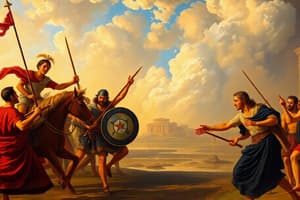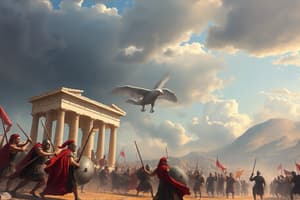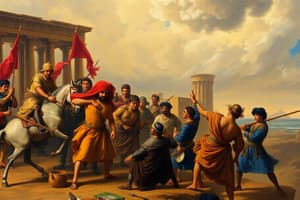Podcast
Questions and Answers
What was a key factor in the Greeks' victory at the Battle of Marathon?
What was a key factor in the Greeks' victory at the Battle of Marathon?
- Strong alliance with Sparta at the time
- Superior Persian tactics
- Outnumbered Greeks utilized effective formations (correct)
- Persians were poorly trained
Which Athenian figure is traditionally associated with the run from Marathon to Athens?
Which Athenian figure is traditionally associated with the run from Marathon to Athens?
- Philippides (correct)
- Darius
- Leonidas
- Pericles
What formation did the Spartans utilize to combat the larger Persian army at the Battle of Thermopylae?
What formation did the Spartans utilize to combat the larger Persian army at the Battle of Thermopylae?
- Skirmish line
- Phalanx (correct)
- Guerrilla tactics
- Cavalry charge
What is a notable feature of the modern marathon distance compared to the ancient marathon?
What is a notable feature of the modern marathon distance compared to the ancient marathon?
How did the Lycurgan reforms influence Spartan soldiers?
How did the Lycurgan reforms influence Spartan soldiers?
What does the term 'democracy' derive from?
What does the term 'democracy' derive from?
What system of government was established through the Lycurgan Reforms in Sparta?
What system of government was established through the Lycurgan Reforms in Sparta?
During the Persian invasions, who was the Persian king that led the Second Invasion?
During the Persian invasions, who was the Persian king that led the Second Invasion?
What characterized the Spartan military strategy in controlling its helot population?
What characterized the Spartan military strategy in controlling its helot population?
What was a significant outcome of the Battle of Thermopylae?
What was a significant outcome of the Battle of Thermopylae?
What major event did the Ionian Greek Revolt lead to?
What major event did the Ionian Greek Revolt lead to?
Which battle was significant for the Athenian victory using their navy against the Persians?
Which battle was significant for the Athenian victory using their navy against the Persians?
What reaction did the Spartan state have toward foreign ideas and travel?
What reaction did the Spartan state have toward foreign ideas and travel?
What significant reforms did Cleisthenes introduce in Athens?
What significant reforms did Cleisthenes introduce in Athens?
What was the outcome of the Battle of Marathon?
What was the outcome of the Battle of Marathon?
Which event marked the beginning of the Ionian Revolt?
Which event marked the beginning of the Ionian Revolt?
How did Pericles contribute to the Golden Age of Athens?
How did Pericles contribute to the Golden Age of Athens?
What led to the unification of Greek forces against Persia during the Second Persian War?
What led to the unification of Greek forces against Persia during the Second Persian War?
What was a primary consequence of the Peloponnesian War for Athens?
What was a primary consequence of the Peloponnesian War for Athens?
What role did the Delian League play after its formation in 478 BC?
What role did the Delian League play after its formation in 478 BC?
Which battle marked a significant defeat for King Xerxes' armies?
Which battle marked a significant defeat for King Xerxes' armies?
Flashcards
Democracy
Democracy
A system of government where power is held by the people.
Oligarchy
Oligarchy
A system of government where power is held by a small group of people.
Spartan State
Spartan State
A powerful Greek city-state focused on military strength and control.
Helots
Helots
Signup and view all the flashcards
Lycurgan Reforms
Lycurgan Reforms
Signup and view all the flashcards
First Persian Invasion
First Persian Invasion
Signup and view all the flashcards
Battle of Marathon
Battle of Marathon
Signup and view all the flashcards
Battle of Thermopylae
Battle of Thermopylae
Signup and view all the flashcards
Darius' Persian Army
Darius' Persian Army
Signup and view all the flashcards
Battle of Marathon (490 BC)
Battle of Marathon (490 BC)
Signup and view all the flashcards
Philippides
Philippides
Signup and view all the flashcards
Spartan Tactics
Spartan Tactics
Signup and view all the flashcards
Solon's Reforms
Solon's Reforms
Signup and view all the flashcards
Peloponnesian League
Peloponnesian League
Signup and view all the flashcards
Persian Conquest
Persian Conquest
Signup and view all the flashcards
Cleisthenes' Reforms
Cleisthenes' Reforms
Signup and view all the flashcards
Ionian Revolt
Ionian Revolt
Signup and view all the flashcards
Pericles' Golden Age
Pericles' Golden Age
Signup and view all the flashcards
First Persian War
First Persian War
Signup and view all the flashcards
Second Persian War
Second Persian War
Signup and view all the flashcards
Study Notes
Ancient Greece
- Geography: Greece is a peninsula with numerous islands, an important factor for trade and cultural exchange
- Timeline of Ancient Greece:
- Earliest Neolithic settlements (c. 6000 BC): Beginning of agriculture
- First settlement of Athens (c. 3000 BC)
- Minoan Civilization (2200-1500 BC): Bronze Age civilization on Crete with unique architecture, labyrinthine palaces, and bull-focused artwork (Minotaur legend); navy for trade, and influence in the Aegean Sea
- Mycenaean Civilization (1900-1100 BC): First confederacy of city-states on mainland Greece. Famous culture focused on honor and glory in battle, including the Trojan War (c. 1194-1184 BC)
- Greek Dark Age (c. 1100-750 BC): Following the collapse of Mycenae, many Greeks migrated. A loss of cultural and written works took place.
- Founding of Sparta (c. 1100-750 BC): Sparta developed into a powerful military oligarchy, conquering neighboring regions and holding people as helots(slaves).
- Homer writes the Iliad and Odyssey (c. 800-700 BC): Epic poems of the Trojan War and Odysseus' journey, regarded as authentic history.
- Greek Colonization (c. 800-500 BC): Greek city-states populated areas like Spain, Sicily, Egypt, and Crimea, spreading their culture and trade
- Reforms of Solon (594 BC): Crucial Athenian reforms canceled land debts and freed enslaved farmers.
Athenian Reforms and Developments
- Reforms of Solon (594 BC): Canceled land debts; freed enslaved farmers; enabled non-aristocrats to be politically active
- Pisistratus' Tyranny (560 BC): Aristocratic leader seized power and established tyrannical trade policies
- Cleisthenes' Reforms (508 BC): Expanded Athenian democracy; instituted the Assembly (with all male citizens) and the Council of Five Hundred (chosen by lot) for foreign affairs and finances.
The Polis
- The Polis: A City-state that was the center of Greek life including the city and the surrounding countryside
- Acropolis: Central hill where citizens gathered for political, social, and religious activities
- Agora: Open space below the acropolis used as a market and assembly place
- Citizens with rights: Adult men
- Citizens with no rights: Women and non-citizens
Spartan State
- Conquered neighboring states and enslaved their inhabitants (Helots) to control a population of laborers.
- Strong military focused on controlling the helots and the Peloponnese
- Discouraged foreign contact and travel, focusing on self-sufficiency.
- Lycurgan Reforms focused on establishing an oligarchy-government by a few.
- Total loyalty to the Spartan State was essential.
Greek Warfare
- Hoplites: Heavily armed infantrymen who carried round shields, swords, and spears
- Phalanx: Rectangular battle formation used to engage enemies head-on
- Triremes: Warships which featured three banks of oars
The Persian Wars
- Ionian Revolt (499-494 BC): Ionians revolted against Persian rule with support from Athens and Eretria.
- The First Persian Invasion (492-490 BC): Persian attempts to conquer Greece, including the Battle of Marathon.
- The Second Persian Invasion (480-479 BC): Persian attempts to conquer the Greece, featuring the Battles of Thermopylae, Salamis, and Plataea.
The Golden Age of Athens
- Major political figures include Pericles
- Artistic development of the Parthenon and flourishing of philosophy, arts and drama
The Peloponnesian War (431-404 BC)
- Rival city-states (Athens and Sparta) fought over control of Greece.
- Major causes included conflict over power (the Athenian Empire) and Athens' influence as a powerful naval power.
- Phases included the Archidamian War, the Sicilian Expedition, and the Decelean War
- The plague in Athens and the Athenian fleet's destruction at Aegospotami contributed to the war's conclusion, ending the Golden Age
- Sparta's victory ultimately weakened all Greek city-states
The Rise of Macedonia (338-323 BC)
- Philip II of Macedonia invaded Greece and unified Greek forces under Macedonian leadership
- Philip II’s assassination allowed his son, Alexander the Great, to take control and expand the Macedonian empire throughout the Persian Empire, until Egypt and parts of India were under Macedonian rule.
- Alexander the Great’s influence led to a period of cultural fusion known as the Hellenistic Era.
The Hellenistic Era
- Era characterized by the spread of Greek culture and ideas throughout Alexander the Great's vast empire in the Hellenistic Kingdoms.
Other Information (Additional details):
- Significant figures in Athenian history, like Solon, Cleisthenes, and Pericles
- Overview of the differences between Athens and Sparta in political and social structures.
- Key battles: Marathon, Thermopylae, Salamis, Plataea, Aegospotami, and Chaeronea.
- Overview of military practices and strategies
- The development of democratic institutions in Athens.
- Role of art (Parthenon).
- Important philosophers in this era (Socrates, for example).
Studying That Suits You
Use AI to generate personalized quizzes and flashcards to suit your learning preferences.




